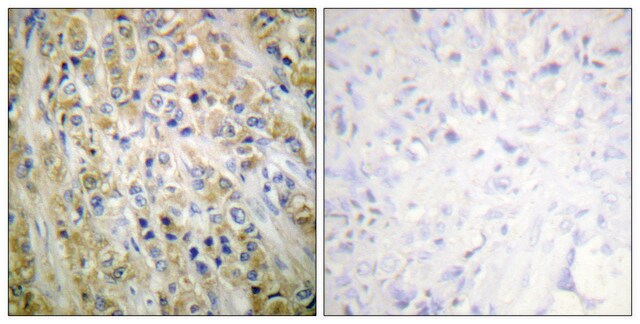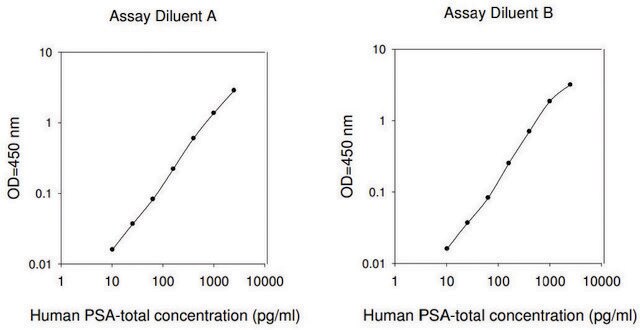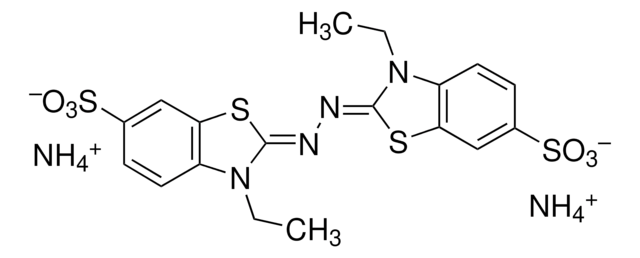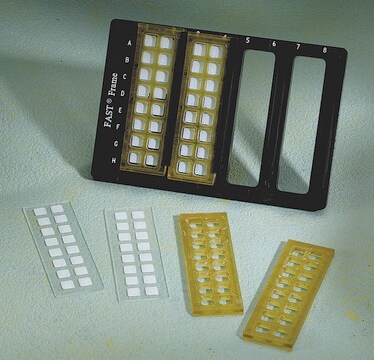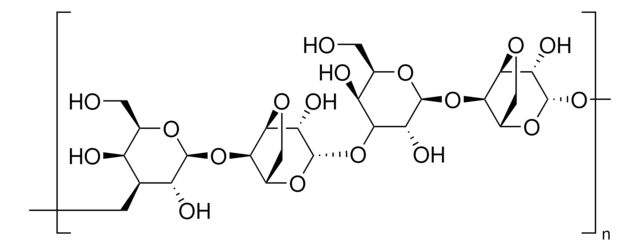P3235
Prostate Specific Antigen from human semen
buffered aqueous solution
Sinonimo/i:
Cancer-associated PSA, PSA
Autenticatiper visualizzare i prezzi riservati alla tua organizzazione & contrattuali
About This Item
Prodotti consigliati
Origine biologica
human semen
Livello qualitativo
Saggio
≥99% (SDS-GE)
Forma fisica
buffered aqueous solution
N° accesso UniProt
Condizioni di spedizione
wet ice
Temperatura di conservazione
−20°C
Informazioni sul gene
human ... KLK3(354)
Cerchi prodotti simili? Visita Guida al confronto tra prodotti
Descrizione generale
Prostate specific antigen (PSA) is a 26kDa single-chain glycoprotein containing 237 amino acids, encoded by the kallikrein gene mapped to human chromosome 19. It is specifically expressed by human prostate tissue and is a highly abundant proteolytic enzyme expressed in the seminal fluid.
Azioni biochim/fisiol
Prostate Specific Antigen (PSA), a glycoprotein of the glandular kallikrein family, is a serine protease with chymotrypsin-like enzymatic activity. Circulating PSA exists in free and protease inhibitor-bound forms. Studying the ratios of free to inhibitor-bound forms may prove valuable in the diagnosis of prostate cancer.
Prostate-specific antigen (PSA) is an androgen-regulated serine protease specifically produced by prostatic tissue and is secreted into the lumen. PSA in semen cleaves semenogelins present in the seminal coagulum. Total PSA levels are increased in serum of prostate cancer (PCa) patients. PSA functions as a potential biomarker for PCa. Serum protease inhibitors such as α1-antichymotrypsin (α1-ACT), α2-macroglobulin (α2-M) and other acute-phase proteins form irreversible complexes with circulating PSA and hinder proteolytic activity of PSA.
Stato fisico
Solution in 10 mM Tris, 0.1% sodium azide, pH 8.0
Codice della classe di stoccaggio
11 - Combustible Solids
Classe di pericolosità dell'acqua (WGK)
WGK 3
Punto d’infiammabilità (°F)
Not applicable
Punto d’infiammabilità (°C)
Not applicable
Certificati d'analisi (COA)
Cerca il Certificati d'analisi (COA) digitando il numero di lotto/batch corrispondente. I numeri di lotto o di batch sono stampati sull'etichetta dei prodotti dopo la parola ‘Lotto’ o ‘Batch’.
Possiedi già questo prodotto?
I documenti relativi ai prodotti acquistati recentemente sono disponibili nell’Archivio dei documenti.
I clienti hanno visto anche
Structure, function, and regulation of the enzyme activity of prostate-specific antigen.
Lilja H
World Journal of Urology, 11(4), 188-191 (1993)
Multiple forms of prostate-specific antigen in serum: differences in immunorecognition by monoclonal and polyclonal assays.
Zhou AM
Clinical Chemistry, 39(12), 2483-2491 (1993)
Qian Dang et al.
Analytical and bioanalytical chemistry, 408(25), 7067-7075 (2016-03-05)
A simple and sensitive electrogenerated chemiluminescence biosensor was developed to monitor matrix metalloproteinase 2 (MMP-2) by employing a specific peptide (CGPLGVRGK) as a molecular recognition substrate. Bis(2,2'-bipyridine)-4'-methyl-4-carboxybipyridine-ruthenium N-succinimidyl ester-bis(hexafluorophosphate) (Ru(bpy)2(mcbpy-O-Su-ester)(PF6)2 (Ru1) was used as ECL-emitting species and covalently labeled onto
Steven P Balk et al.
Journal of clinical oncology : official journal of the American Society of Clinical Oncology, 21(2), 383-391 (2003-01-15)
Prostate-specific antigen (PSA) is an androgen-regulated serine protease produced by both prostate epithelial cells and prostate cancer (PCa) and is the most commonly used serum marker for cancer. It is a member of the tissue kallikrein family, some of the
D A Armbruster
Clinical chemistry, 39(2), 181-195 (1993-02-01)
Prostate-specific antigen (PSA) is a glycoprotein produced exclusively by prostatic tissue. PSA's absolute tissue specificity makes it valuable as a forensic marker and, more important, as a tumor marker for prostatic cancer. Prostatic cancer is prevalent in the older male
Il team dei nostri ricercatori vanta grande esperienza in tutte le aree della ricerca quali Life Science, scienza dei materiali, sintesi chimica, cromatografia, discipline analitiche, ecc..
Contatta l'Assistenza Tecnica.
